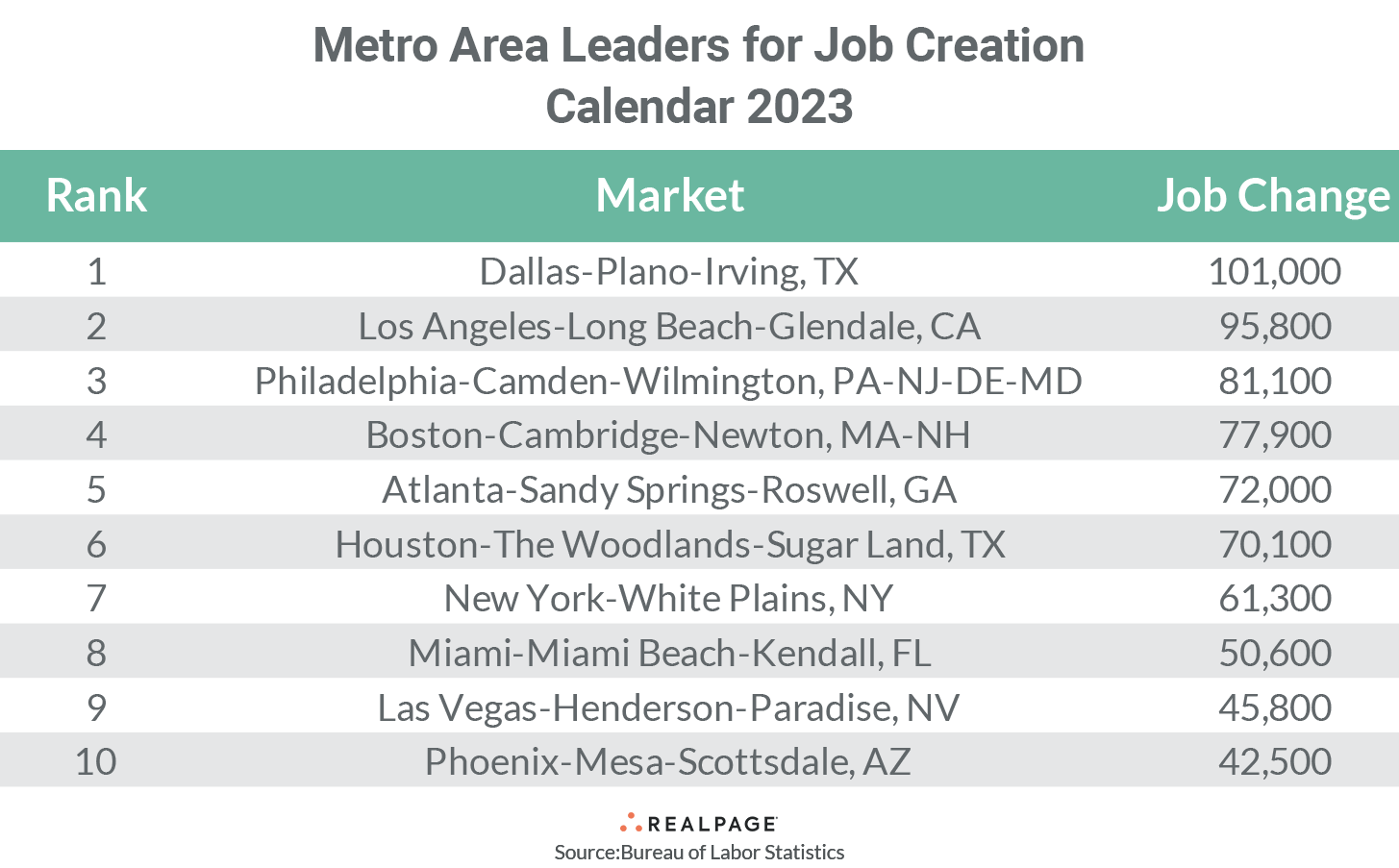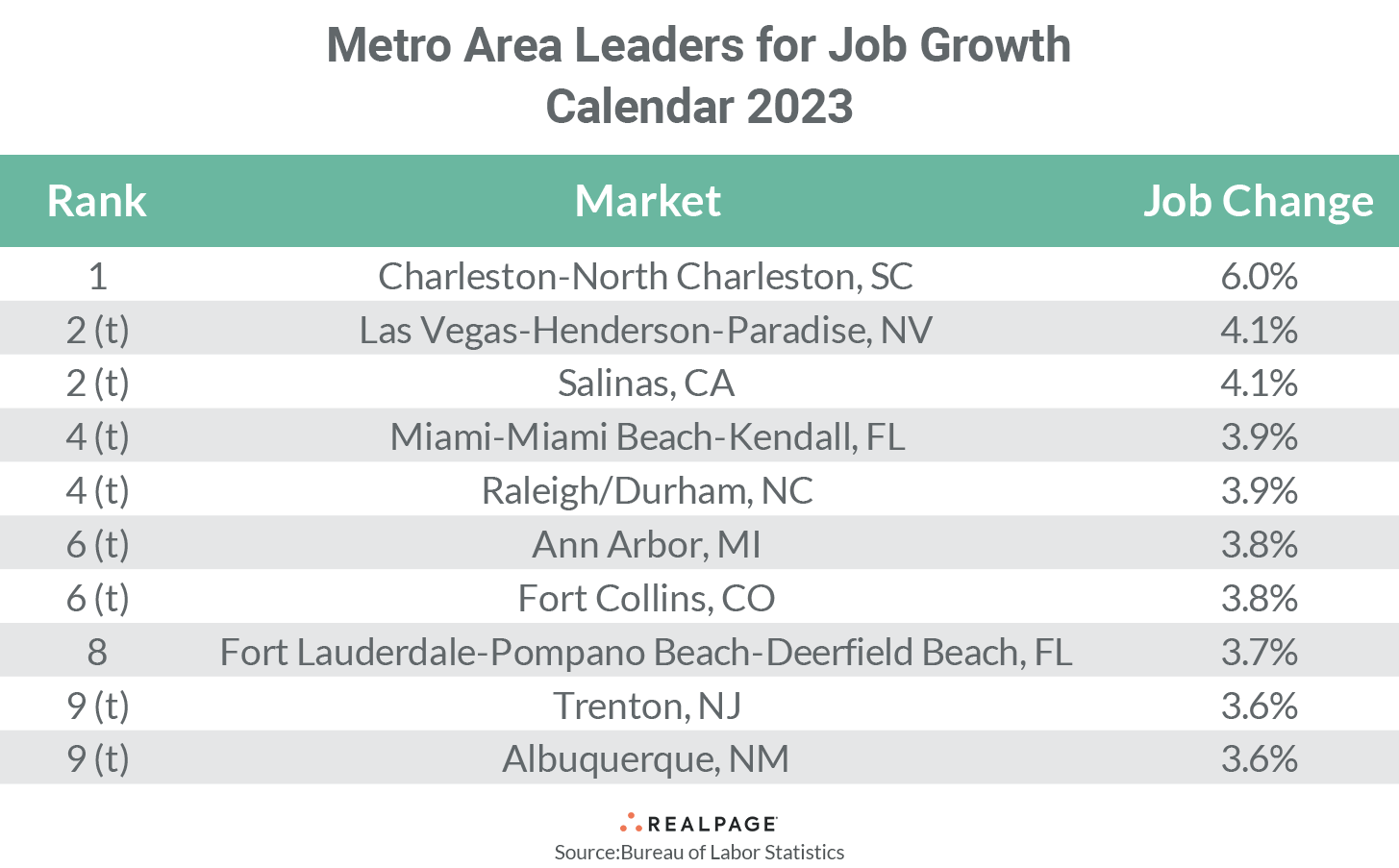After taking the number one spot away from New York last month, the Dallas-Plano-Irving metro division remained the top market for employment gains, adding 101,000 jobs to their economy in 2023.
According to the latest data release from the Bureau of Labor Statistics (BLS), Dallas was the only market to gain 100,000 jobs or more for the year, followed closely by Los Angeles with a 95,800-job gain.
Nine of the top 10 markets returned from November’s list with several changing places. Last month’s #2 – New York – fell to #7 in December with the Big Apple adding 61,300 jobs for the year. Philadelphia remained in the #3 spot with 81,100 jobs added, down just 2,100 jobs from November.
Boston moved up from #7 to #4, gaining 77,900 jobs in 2023, an improvement from both November and last December. Atlanta ticked up one spot to #5 with 72,000 jobs gained, but their annual total was 27,600 less than in 2022.
Houston slipped two spots to #6, gaining 70,100 jobs, followed by the aforementioned New York. Miami remained in the #8 spot in December with 50,600 jobs gained, about the same as November’s total but 6,600 less than December 2022.
Las Vegas jumped into the top 10 at #9 with a gain of 45,800 jobs and Phoenix returned at #10 with 42,500 additional jobs.
Altogether, the total number of jobs gained for the year-ending December for the top 10 markets was down 22,300 jobs from their collective total last month. However, the next 10 markets (#11-#20) saw their combined annual jobs gains increase by 12,800 jobs.
As mentioned, only Dallas exceeded 100,000 jobs gained for the year while seven gained between 50,000 and 99,999 jobs, one more than last month. Seven markets reported annual job losses for the year, two less than last month as Denver and Detroit continue to struggle.
Like annual job gains, the annual percentage change in employment saw some changes as well. Seven of last month’s top employment growth markets returned in December and most changed places. However, the average employment percentage gain for the top 10 markets averaged 4.1% in December, equal to last month.
Charleston, SC returned as #1 with 6% employment growth, 10 basis points (bps) above last month’s rate. Las Vegas and Salinas, CA tied for #2 with 4.1% growth but Las Vegas jumped 30 bps for the month while Salinas fell 40 bps.
Miami and Raleigh/Durham tied for #4 with the same growth rates they had last month – 3.9%. Ann Arbor, MI and Fort Collins, CO tied for #6 with 3.8% employment growth and each improved from their November growth rates.
Fort Lauderdale joined the top 10 at #8 with an annual job growth rate of 3.7% in December, up 60 bps from November. Trenton, NJ and Albuquerque, NM tied for the las two spots on the list with 3.6% growth, but Trenton slowed by 40 bps while Albuquerque surged by 120 bps. Boise, Jacksonville and Midland/Odessa were the three markets that fell off the top job growth markets list this month.
Compared to one year ago, six markets saw stronger job growth than last December, led by Fort Collins with an improvement of 290 bps. Albuquerque jumped 180 bps while the small markets of Ann Arbor and Salinas increased by about 100 bps. The four top 10 markets with slowing job growth did not fall far from their growth rates last year, with the exception of Las Vegas, which slowed by 150 bps.
Outside of the top growth markets, Birmingham, AL, Spokane, WA, Akron, OH, Santa Maria-Santa Barbara, CA and Baltimore saw their job growth rates increase by 180 bps or more from last year. Meanwhile, Midland/Odessa, Orlando, Wilmington, NC, Cape Coral-Fort Myers, FL and Austin fell by at least 350 bps from last year’s job growth.
Major markets with employment declines are Denver and Detroit, while Memphis was unchanged. Sub-1% growth markets include Milwaukee, Columbus, OH, Buffalo, Virginia Beach, Des Moines, Chicago, New York, Kansas City and San Jose. Sub-1.5% growth major markets include West Palm Beach, Washington, DC, Portland, OR and San Francisco. Sixty-nine markets had annual job growth rates above the not seasonally adjusted national average of 1.9%, eight fewer than in November.









